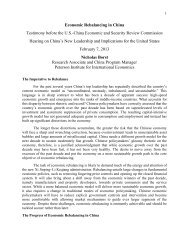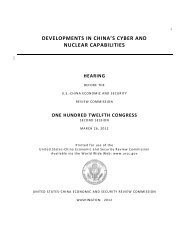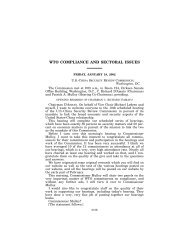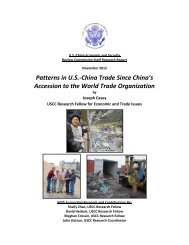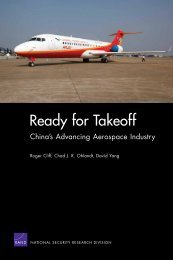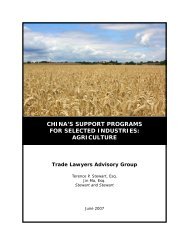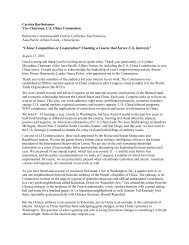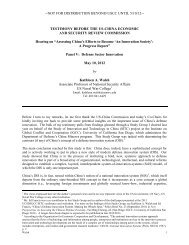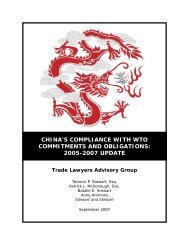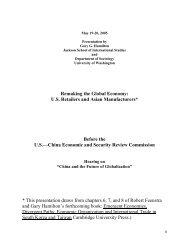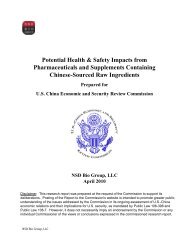2011 report to congress - U.S.-China Economic and Security Review ...
2011 report to congress - U.S.-China Economic and Security Review ...
2011 report to congress - U.S.-China Economic and Security Review ...
You also want an ePaper? Increase the reach of your titles
YUMPU automatically turns print PDFs into web optimized ePapers that Google loves.
dkrause on DSKHT7XVN1PROD with $$_JOB34526. U.S.-<strong>China</strong> <strong>Economic</strong> <strong>and</strong> <strong>Security</strong> <strong>Review</strong> Commission, Hearing on <strong>China</strong>’sPropag<strong>and</strong>a <strong>and</strong> Influence Operations, Its Intelligence Activities that Target theUnited States, <strong>and</strong> the Resulting Impacts on U.S. National <strong>Security</strong>, written testimonyof Ross Terrill <strong>and</strong> oral testimony of Anne-Marie Brady, April 30, 2009.27. For an example of PRC accusations that negative views of <strong>China</strong> are fosteredby western governments as part of a broader campaign of containment, see MoNong, ‘‘Part of the Plot <strong>to</strong> Contain <strong>China</strong>,’’ <strong>China</strong> Daily, Oc<strong>to</strong>ber 11, 2010. http://www.chinadaily .com.cn/opinion/2010-10/11/content_11392433.htm.28. David Shambaugh, Beautiful Imperialist: <strong>China</strong> Perceives America, 1972-1990 (Prince<strong>to</strong>n, NJ: Prince<strong>to</strong>n University Press, 1992); Philip Saunders, ‘‘<strong>China</strong>’sAmerica Watchers: Changing Attitudes Towards the United States,’’ <strong>China</strong> Quarterly161 (March 2000); Rosalie Chen, ‘‘<strong>China</strong> Perceives America: Perspectives ofInternational Relations Experts,’’ Journal of Contemporary <strong>China</strong> 12: 35 (2003); <strong>and</strong>David Shambaugh, ‘‘Coping with a Conflicted <strong>China</strong>,’’ Washing<strong>to</strong>n Quarterly (Winter<strong>2011</strong>).29. U.S.-<strong>China</strong> <strong>Economic</strong> <strong>and</strong> <strong>Security</strong> <strong>Review</strong> Commission, Hearing on <strong>China</strong>’sNarratives Regarding National <strong>Security</strong> Policy, written testimony of Gary Rawnsley,March 10, <strong>2011</strong>.30. Dai Xu, ‘‘Zhongguo Ying Gei Meiguo Weidu Xingwei Hua Hong Xian’’ (<strong>China</strong>Must Draw a Red Line Against America’s Encircling Actions), Huanqiu Shibao(Global Times), August 2, 2010. Translation by USCC staff. http://opinion.huanqiu.com/roll/2010-08/977633.html.31. BBC News OnLine, ‘‘<strong>China</strong> Attacks Bush Foreign Policy,’’ November 1, 2004.http://news.bbc.co.uk/2/hi/asia-pacific/3971271.stm.32. The depiction of the United States as a preda<strong>to</strong>ry ‘‘hegemon’’ is a pillar ofthe official CCP conception of international affairs. This term has two specific setsof connotations as employed by Chinese writers. One is tied <strong>to</strong> ancient Chinese conceptsof statecraft: As described by author Michael Pillsbury, ‘‘One specific Chinesepremise from the ancient statecraft of the Warring States era seems <strong>to</strong> influenceChinese authors who write about the United States <strong>to</strong>day — the concept of how <strong>to</strong>diagnose <strong>and</strong> deal with a powerful ‘hegemon’ (ba) that seeks <strong>to</strong> dominate severalother less powerful states. The way hegemons conducted themselves during theWarring States period of ancient <strong>China</strong> forms one of the sources of the classic lessonsof Chinese statecraft . . . One set of ‘lessons’ (among many) was how <strong>to</strong> becomea hegemon; another was how <strong>to</strong> survive destruction at the h<strong>and</strong>s of a preda<strong>to</strong>ryhegemon.’’ See Michael Pillsbury, <strong>China</strong> Debates the Future <strong>Security</strong> Environment(Honolulu, HI: University Press of the Pacific, 2005), pp. xxxv-xxxvi. The second se<strong>to</strong>f connotations is tied <strong>to</strong> the CCP’s official Marxist interpretations of modern his<strong>to</strong>ry<strong>and</strong> in particular <strong>to</strong> the analysis of the contemporary world system as laiddown by Deng Xiaoping in the late 1980s: ‘‘The world is so full of colonialism,neocolonialism, hegemony <strong>and</strong> power politics! . . . one Cold War . . . is being wagedagainst all the countries of the South <strong>and</strong> the Third World, <strong>and</strong> the other againstsocialism. The Western countries . . . want <strong>to</strong> bring about the peaceful evolution ofsocialist countries <strong>to</strong>wards capitalism. . . . National sovereignty is far more importantthan human rights, but they often infringe upon the sovereignty of poor, weakcountries of the Third World. Their talk about human rights, freedom <strong>and</strong> democracyis only designed <strong>to</strong> safeguard the interests of the strong, rich countries, whichtake advantage of their strength <strong>to</strong> bully weak countries, <strong>and</strong> which pursue hegemony<strong>and</strong> practice power politics.’’ See Deng Xiaoping, ‘‘We Must Adhere To Socialism<strong>and</strong> Prevent Peaceful Evolution Towards Capitalism’’ (excerpt from a conversationwith Julius Nyerere, former president of Tanzania), November 23, 1989. From theSelected Works of Deng Xiaoping, Vol. 3 (Beijing, <strong>China</strong>: Foreign LanguagesPress, 1994). http://www.archive.org/stream/SelectedWorksOfDengXiaopingVol.3/Deng03_djvu.txt.33. Yong Deng, ‘‘Hegemon on the Offensive: Chinese Perspectives on U.S. GlobalStrategy,’’ Political Science Quarterly 116: 3 (2001).34. For examples, see Global Times, ‘‘Turbulent Mid-East Disrupts the World,’’February 26, <strong>2011</strong>. http://opinion.globaltimes.cn/edi<strong>to</strong>rial/<strong>2011</strong>-02/627723.html; U.S.-<strong>China</strong> <strong>Economic</strong> <strong>and</strong> <strong>Security</strong> <strong>Review</strong> Commission, 2009 Annual Report <strong>to</strong> Congress(Washing<strong>to</strong>n, DC: U.S. Government Printing Office, November 2009), pp. 278–280;<strong>and</strong> Beijing Ribao (Beijing Daily), ‘‘Weihu Wending cong Meigeren Zuoqi’’ (MaintainingStability Starts with Every Person), March 6, <strong>2011</strong>. Translation by USCC staff.http://bjrb.bjd.com.cn/html/<strong>2011</strong>-03/06/content_375830.htm.35. Andrew Nathan <strong>and</strong> Perry Link, eds., The Tiananmen Papers (New York,NY: Public Affairs Books, 2001). See in particular ‘‘Excerpts from State <strong>Security</strong>Ministry, ‘On Ideological <strong>and</strong> Political Infiltration in<strong>to</strong> Our Country from the UnitedStates <strong>and</strong> Other International Political Forces,’ <strong>report</strong> <strong>to</strong> Party Central, June 1,’’pp. 338–348.VerDate Nov 24 2008 13:46 Nov 10, <strong>2011</strong> Jkt 067464 PO 00000 Frm 00357 Fmt 6601 Sfmt 6621 G:\GSDD\USCC\<strong>2011</strong>\067464.XXX 067464



